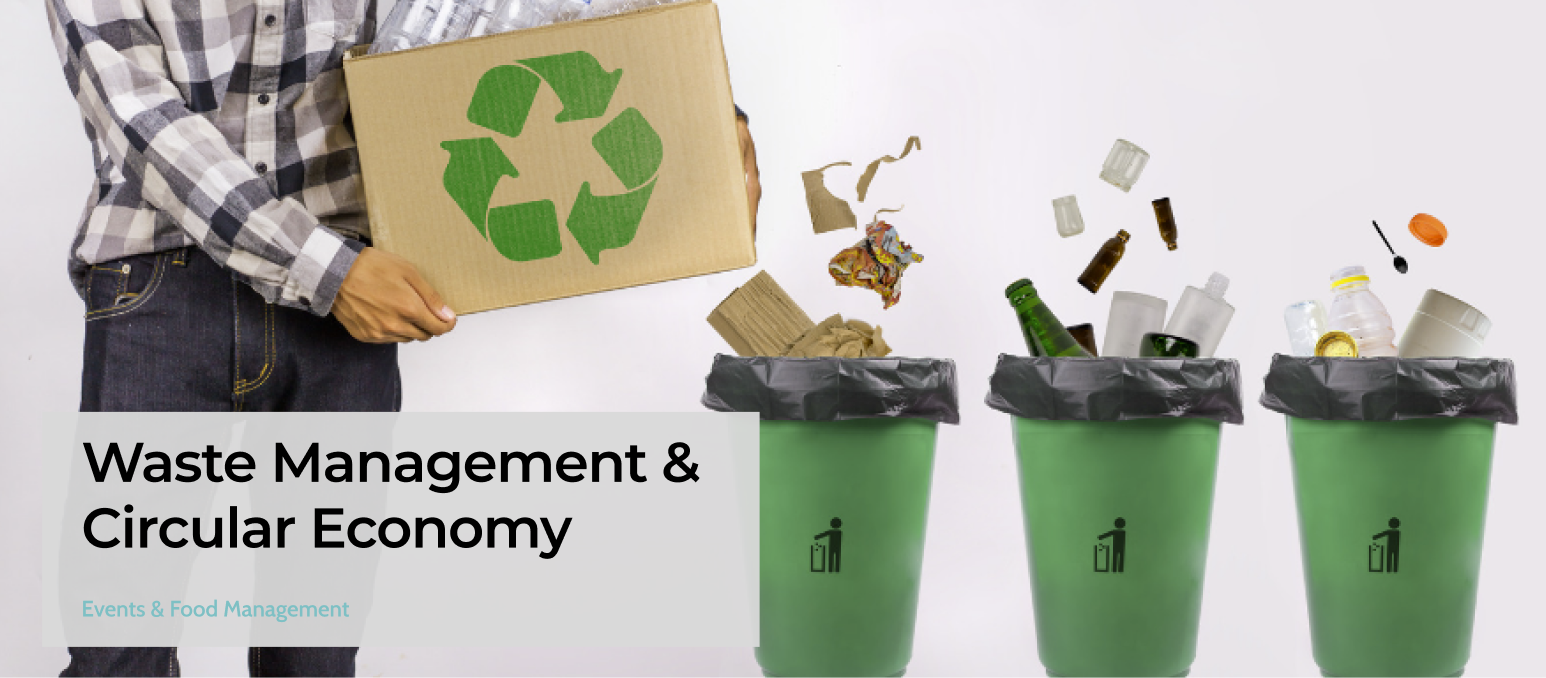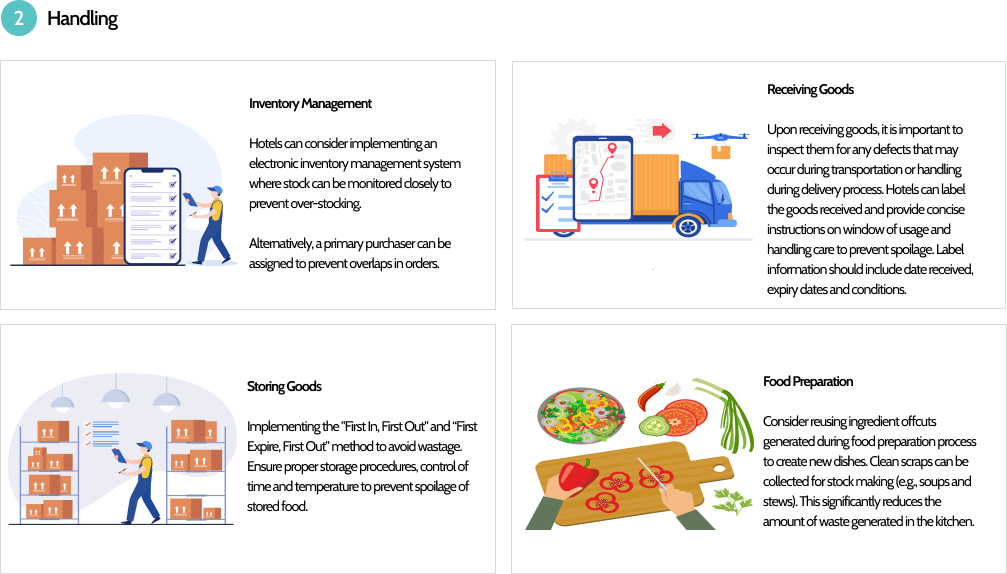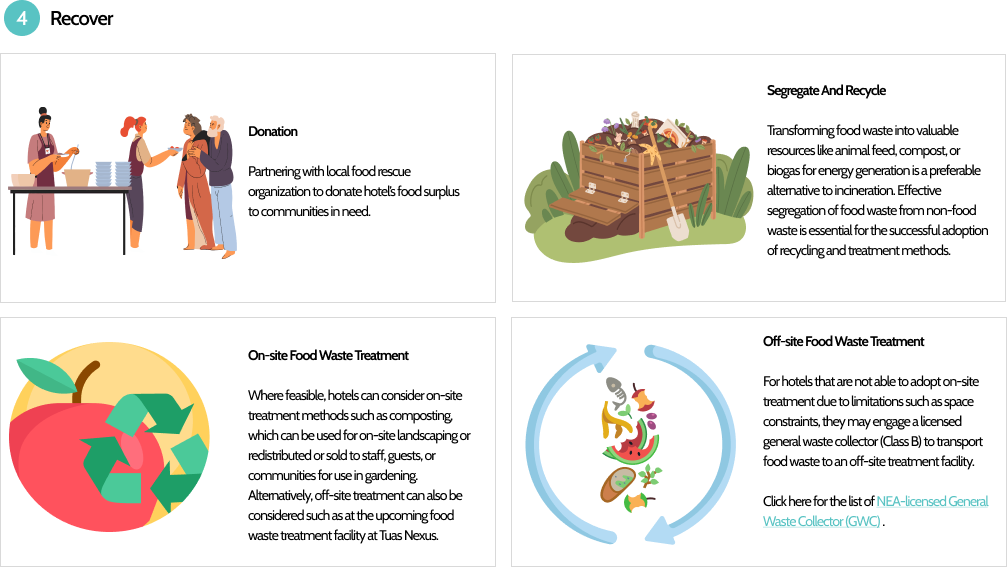
Waste has become a serious global concern due to the significant impacts it has on the environment.
Hotels that provide event spaces and F&B services are particularly susceptible to generating general and food waste due to the use of materials for venue set-up and high volume of food preparation and consumption. For instance, wasted is generated when large quantities of food were prepared but unconsumed by guests or spoilage due to inadequate food management.
Our recommended methodology begins with an audit process that determines the current state of waste produced during events and in F&B services at hotels. This helps to highlight areas of high waste generation accurately, thereby allowing hotels to target their efforts effectively in reducing, reusing, recycling to achieve zero waste from their work processes.
Some of the common solutions include:
|
| Solutions: Reduce, reuse and recycle of materials and products |
| Educate:
Educational engagements with staff and guests by introducing concepts on circular economy, ways to reduce waste generation, and the importance of implementing it within hotels’ business practices | |
| Monitor and Review: Implementation of waste monitoring systems to effectively manage hotel’s waste and excessive consumption in a strategic and orderly manner |
Implementing waste management strategies for events and the F&B services not only results in greater operational efficiencies, but it also alleviates environmental impact caused by large amount of waste generated from hotel services and work processes.
Today, preventing food waste is a high priority. With several essential resources such as water and energy required for food to grow and be transported, it is important that we maximise the usage of the produced sustenance.
Global Best Practices
General Audit
Performing periodic waste audits has many benefits as it will enable hotels to probe the key reasons that drive waste, provide a breakdown of waste contents, and uncover opportunities to enhance sustainability practices.
During the waste audit, it is crucial to separate and measure waste generated. This provides transparency and insights into the largest drivers of waste, enabling hotels to plan for reduction effectively. Hotels can gain information on the types and quantities of waste generated, as well as the root causes of waste, such as overproduction, spoilage, or customer's plate waste.
A well-performed audit can have measurable impact in optimising the waste management system in hotels. For instance, finding out the average food consumption quantity for an individual can translate into waste reduction opportunities, such as reducing standard portion sizes for food served.
Ultimately, it is important for hotels to have a good waste management programme to direct and set them on a sustainability pathway with achievable targets and goals. Furthermore, being sustainable saves overall business operating costs and enhances the brand reputation and credibility of hotels.
Typically, an audit process consists of a few main steps. Some of these steps may vary in different industries and sectors, however, the general flow remains the same.

Hotels can consider using Hotel Waste Measurement Methodology (Hotel Waste Measurement Methodology – Sustainable Hospitality Alliance) developed jointly by WWF-US and Greenview to collect waste data, measure and report waste in hotels. The tool was developed to provide a consistent framework the industry can use to track waste, fill in data gaps, and report annual progress against goals.
Resources:
How to Reduce Food Waste in Restaurants | Nisbets Australia | 5 Steps to Performing a Food Waste Audit | News (specialtyfood.com)
Solutions
Drawing from the insights gained through the audit process, hotels can deploy a variety of solutions to achieve higher efficiency in their waste management efforts and to increase circularity within their events and F&B services.
These solutions can be implemented independently or in combination to prevent the generation of unnecessary waste and increase the effectiveness of closed-loop approaches aimed at reducing waste generation from hotel events and F&B services management. Reducing waste can also result in overall cost savings for hotels, leading to higher business productivity and customer satisfaction.
Here are the common waste management solutions for events and F&B services. Do note that the list provided is non-exhaustive. Some of the solutions for reducing waste generation at event venues are also covered in Operations management – waste section.
Additionally, hotels can refer to the Workshop Agreement (WA) 3 Sustainable MICE- Guidelines for waste management which was launched by Singapore Association of Convention & Exhibition Organisers & Suppliers (SACEOS) and the Singapore Standards Council (SSC) for more guidelines.









